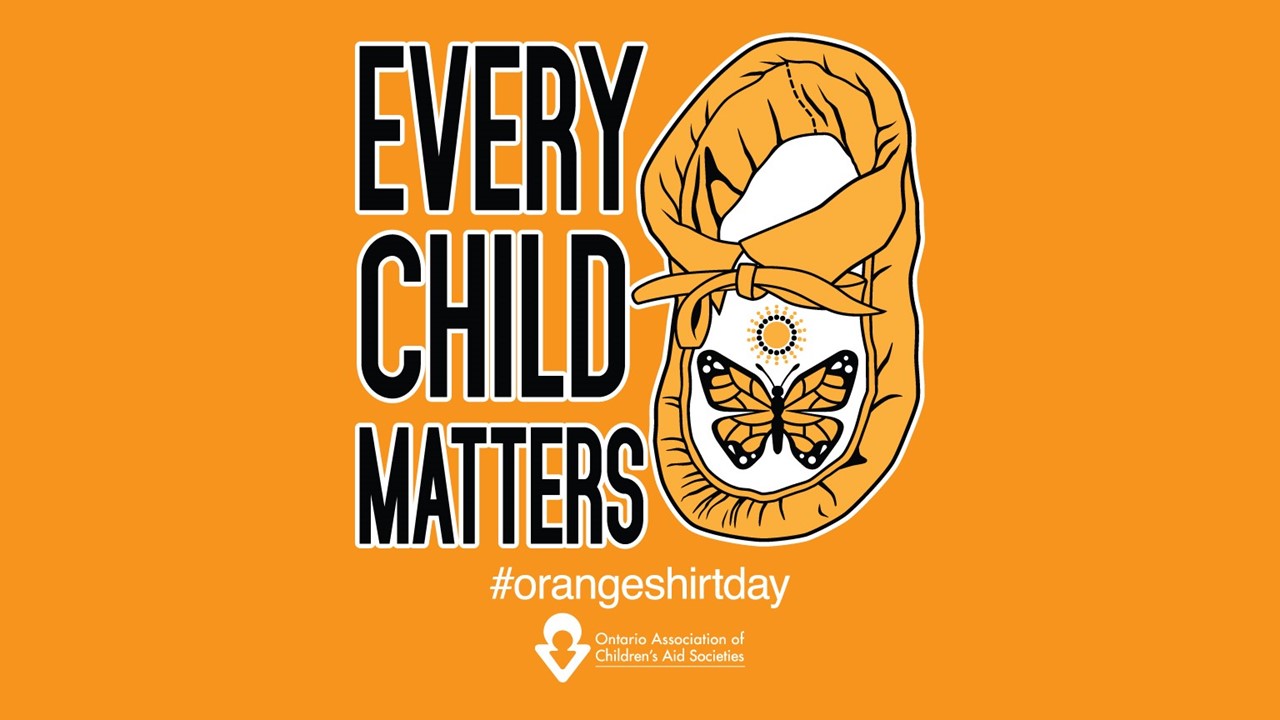Julia L. Jamieson, of the Six Nations of the Grand River Haudenosaunee Cayuga Nation, recently joined OACAS as Director of First Nations, Métis, and Inuit (FNMI) Holistic Practices, where she is focused on supporting truth and reconciliation in the Ontario child welfare sector. In this new position, she is working alongside key First Nations, Métis, and Inuit partners to build and strengthen relationships across Indigenous communities, and to provide guidance and support to child welfare agencies and their staff towards better outcomes for children, youth, and families.
Here, Julia tells us a bit more about herself, her role, and her message for National Day for Truth and Reconciliation.
What experiences have brought you to this role at this moment in time?
I would say three things. The first is land. As my first teacher, I resonate with interconnectivity and the responsibility in it. The land grounds my, and our, healing from colonial power knowledge, so that I or we, may help others along their healing journey. Much of my career has focused on education as a tool for child welfare reform, and the need to disentangle prevention practice from how we understand and assess risk, especially for Indigenous communities.
The second are ancestors. Stories woven through generations are embedded, not only in my soul’s journey, but ancestral wisdom across Turtle Island. Stories are the carriers of legacy. None of us own this work. We are merely leaving in our wake equitable practices that disrupt, unsettle, and challenge narratives that have misrepresented the Indigenous family system for over 150 years, under the guise of child welfare. Traditional cultural protocols, where birthing and naming ceremonies are practiced, as well as rights of the Indigenous child must be respected when caring for our most sacred gifts, our children.
And finally, the third thing that has brought me to where I am today is conviction. A collective duty to protect such protocols.
What are your main priorities in your new role? What are you most excited about?
…”those upon whose backs research has historically been carried on are the people who know the most about social oppressions, marginalization and colonization” (Tuck et al., 2008).
Highlighting the work of Indigenous researchers and allies in academia is imperative to child welfare redesign. I often think about Murray Sinclair’s quote that education is what got us into this mess, and education is what is going to get us out of it.
Also, in partnership with ANCFSAO, I look forward to engaging First Nations, Métis, and Inuit communities to review the current Ontario protection standards and tools. We need to critically analyze these provincial tools to make sure they are culturally relevant and sensitive.
I am looking to support province wide training in First Nations principles of ownership, control, access, and possession OCAP® over data collection. There is an overarching obligation that demands consistent leadership, inclusive of Indigenous data management systems, that exercise such data sovereignty.
I am most excited to discuss a redesign in child welfare that dissects, recenters, problem-poses, and sets perimeters for what is known and what we, as a strong collective, must learn in allyship.
What does truth and reconciliation mean to you?
It means we know what needs to be done. There are milestones clearly lit for us. It means we — you, and I — are in this time to act. It means we can create a story together.
It is holding space for truth. It is painful. It means Indigenous epistemologies prevail and have never seized to prevail.
It is truth before reconciliation.
What message do you want to share ahead of National Day for Truth and Reconciliation on September 30?
I recently had the chance to talk with Jennifer Podemski, who shared the story of her TV series, Little Bird and the impacts of the Sixties Scoop. Stories like this must be heard.
I also encourage you to listen to the words of Dr. Dwayne Donald, as he speaks on the importance of land as relative, kinship relationality and walking as a healing practice. Let us go for a walk together on September 30 in solemn reflection of the survivors of residential school, their families, and the little ones who never made it home.
Be Well. Take Care of One Another…
To learn more about the work OACAS is doing to support reconciliation within Ontario child welfare, contact Julia Jamieson, Director of FNMI Holistic Practices at jjamieson@oacas.org.
